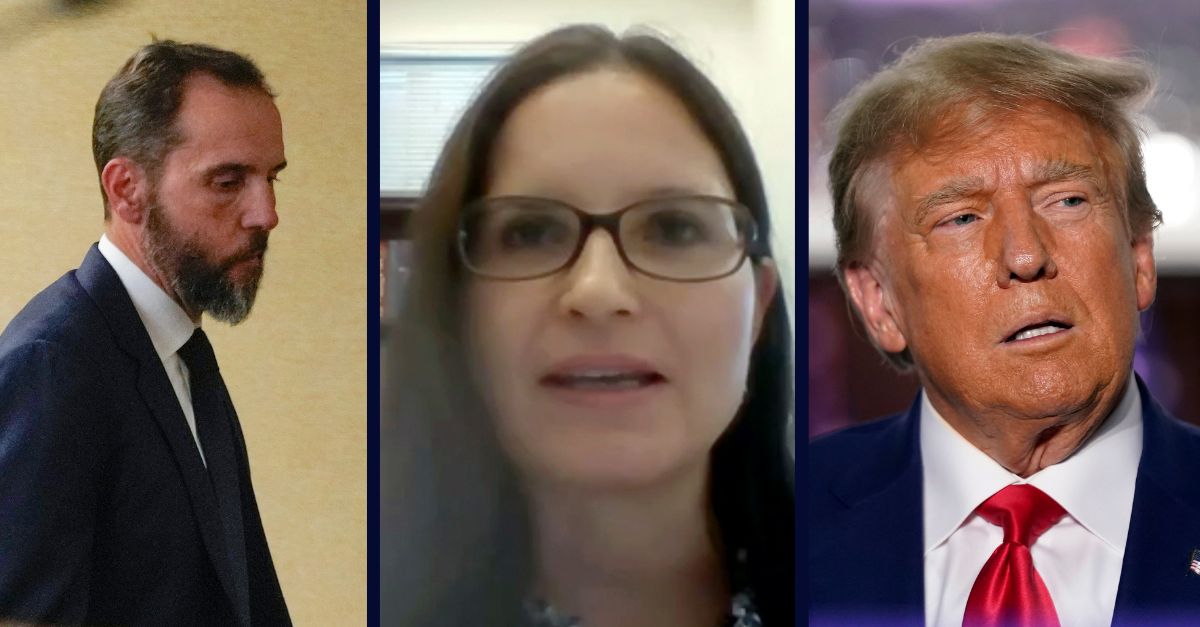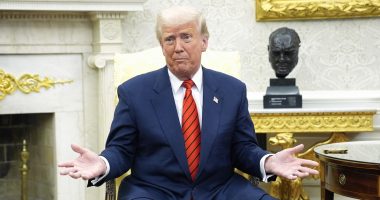
Left to right: Special counsel Jack Smith (AP Photo/Jacquelyn Martin); U.S. District Judge Aileen Cannon (U.S. Senate via AP); Former President Donald Trump (AP Photo/Andrew Harnik, File).
Two days after the judge in the Mar-a-Lago case told the special counsel she was “disappointed” in him, unsealed documents from February and March revealed the specifics of the formerly secret clash between Donald Trump’s lawyers and Jack Smith over defense allegations of “prosecutorial misconduct” and violations of due process.
As recently as Sunday, U.S. District Judge Aileen Cannon issued an order for the prosecution and defense to file documents related to Trump’s motion to dismiss the Espionage Act indictment on grounds of alleged prosecutorial misconduct. Although Cannon partially granted Smith’s redaction requests, she nonetheless slammed the special counsel in no uncertain terms, also writing to “express concern” about his “treatment of certain sealed materials in this case.”
The judge accused Smith of inconsistently applying the witness safety and secrecy rules — rules he threatened to appeal for — just to “refute defense allegations of prosecutorial misconduct,” prompting Cannon to say she was “disappointed” that Smith undermined “prior representations” to the court.
Now the filings have gone public, and they reveal that the defense asked Cannon to toss the case or at least suppress 15 boxes of documents Trump handed over to the National Archives (NARA) in January 2022, a document return that took place approximately a year and a half before the former president and co-defendants Walt Nauta and Carlos De Oliveira faced an indictment.
The defense maintains that “prosecutorial misconduct and violations of President Trump’s due process rights during the investigation and in grand jury proceedings” require dismissal or at minimum a ruling barring Smith from using the 15 boxes at issue against the defendant in the willful retention of national defense information case.
In summary, the defense theorizes that President Joe Biden’s administration “collude[d] in bad faith” with NARA, the DOJ, and the FBI as part of a “politically motivated” setup ahead of the 2024 election to “improperly target” Trump and violate his “constitutional rights by using civil authorities to collect evidence for use in a criminal prosecution” over classified documents.
“Politically biased NARA officials violated the agency’s regulations, and broke custom and practice dating back to the enactment of the PRA [Presidential Records Act], by colluding with the Biden Administration to initiate a criminal investigation of President Trump rather than simply collecting the records that President Trump had designated as Presidential Records,” the motion said. “The process began with the Archivist and a Biden Administration White House Official monitoring President Trump’s exit from the White House as if they were FBI agents, and continued with NARA’s ‘informal[]’ contact with DOJ in September 2021.”
More Law&Crime coverage: Trump weirdly gave ‘you’re the man’ response after Mar-a-Lago visitor said ‘whatever you have, give everything back’ and don’t give feds a reason to indict you, exhibit says
The defense attempted the make the case that the NARA “sham” criminal referral that followed blindsided them, as politically motivated actors at NARA “coordinated with the Biden Administration and DOJ to conceal the timing of prosecutors’ involvement” and “mislead President Trump’s PRA representatives into believing that at most NARA was considering using civil recovery authorities[.]”
The cherry on top of that unpalatable sundae, the defense asserted, was the NARA archivist’s “biased” rejection of Trump’s post-presidency “executive privilege claim” over the documents.
“NARA’s May 2022 coordination with the Biden Administration and DOJ to reject President Trump’s executive privilege claim was a further violation of due process and serves as additional evidence of the unlawful coordination between these entities,” the defense claimed.
In support of their argument, the defense lawyers gave a shoutout to Trump-appointed Supreme Court Justice Brett Kavanaugh:
At least one Supreme Court Justice disagrees with the NARA’s biased conclusion. See Trump v. Thompson, 142 S. Ct. 680 (2022) (Kavanaugh, J., statement respecting denial of application) (“A former President must be able to successfully invoke the Presidential communications privilege for communications that occurred during his Presidency, even if the current President does not support the privilege claim. Concluding otherwise would eviscerate the executive privilege for Presidential communications.”). And this is not the only instance of DOJ seeking to circumvent President Trump’s executive privilege.
For the purposes of discovery, the defense lumped the White House and NARA into the “prosecution team,” whom the lawyers additionally accused of delaying the indictment to ensure Trump’s 2024 election campaign and reelection chances would be hampered.
But there’s more.
Trump accused Smith and the Special Counsel’s office of misconduct by “presenting evidence to a grand jury” in Washington, D.C., when the Mar-a-Lago case is based in Florida.
The “obvious lack of venue” exploited by Smith, the defense said, amounted to “forum shopping at a courthouse they deemed friendly as they simultaneously presented a false narrative concerning events around the 2020 election.”
The defense further claimed Smith’s team “abused the grand jury process” by “engaging in abusive and improper questioning of one of President Trump’s former attorneys and issuing a pretextual subpoena to NARA.”
Smith, for his part, opposed Trump’s motion in early March, writing that Trump didn’t come close to making the “rigorous factual showings” needed to prove his misconduct claims, especially claims about NARA that “rest entirely on a false premise” that the agency essentially set Trump up for prosecution by demanding he return the aforementioned 15 boxes, which had “highly classified documents intermingled with other records” inside.
The special counsel traced Trump’s collusion arguments to “a single sentence in an email that NARA’s General Counsel sent to his colleagues on September 1, 2021, circulating a draft letter (never actually sent) asking the Attorney General to initiate a civil proceeding to recover presidential records.”
“In the email, the General Counsel advised his colleagues that he had ‘informally reached out to DOJ counsel about this issue,’ which Trump characterizes as proof that ‘by September 1, 2021,’ NARA was ‘communicating with prosecutors,”” the filing said, noting the email was sent roughly four months before Trump returned the boxes.
“In fact,” Smith added, “NARA’s General Counsel did not ‘reach[] out’ to a criminal prosecutor. Rather, consistent with NARA’s statutory duties, 44 U.S.C. § 2905(a), he conferred with a civil attorney at DOJ about the document-recovery issue discussed in the draft letter, just as NARA repeatedly advised Trump’s PRA representatives it would do.”
The special counsel said there can be no dismissal considering that two government agencies merely engaged in “common and proper” communications with one another, but he added a stinging footnote calling into question Trump’s “logic”:
Trump appears to suggest that if he had known that he was under criminal investigation for destroying the documents contained in the boxes, then he would have refused to exonerate himself by returning those boxes, but he makes no effort to explain the logic behind this premise.
Calling Trump’s claims of outreach from NARA’s general counsel to a criminal prosecutor a “conspiracy theory” unmoored from fact, the special counsel said that even if Trump’s assertions were true they’d still fail.
“So even if it were true (which it is not) that a criminal prosecution was being contemplated and NARA’s General Counsel had ‘informally reached out’ to a criminal prosecutor, Trump’s claim would still lack any of the crucial ingredients of a colorable due process claim,” Smith wrote.
One section subheading got straight to the point: “Trump’s Narrative of Bad-Faith Collusion Is Baseless.”
From here, Smith said Trump’s complaints about the rejection of his executive privilege claim didn’t fare any better, as he pointed out that Trump could have, as he so often does, sued. Trump shouldn’t be rewarded for his failure to sue, Smith argued.
“NARA complied at all times with the applicable statutes and regulations. And Trump never attempted to avail himself of the statutory remedy that explicitly permits a former President to bring an action ‘asserting that a determination made by the Archivist violates the former President’s rights or privileges,’ 44 U.S.C. § 2204(e), which, if successful, would have required NARA to ‘withhold the record’ from the FBI,” the special counsel said. “His belated challenge to the procedures NARA used in assessing his privilege claim provide no basis for suppression or dismissal.”
Smith likewise said Trump neither made a showing that the indictment was tactically timed to ruin his 2024 campaign nor credibly argued that D.C. grand jury proceeding was improper.
“When the Government started the grand jury investigation, it could not know the full scope of the evidence that would be gathered. But from the outset, the investigation encompassed conduct that spanned the District of Columbia and the Southern District of Florida, and the investigation uncovered evidence of federal offenses in both districts,” Smith said.
Have a tip we should know? [email protected]







